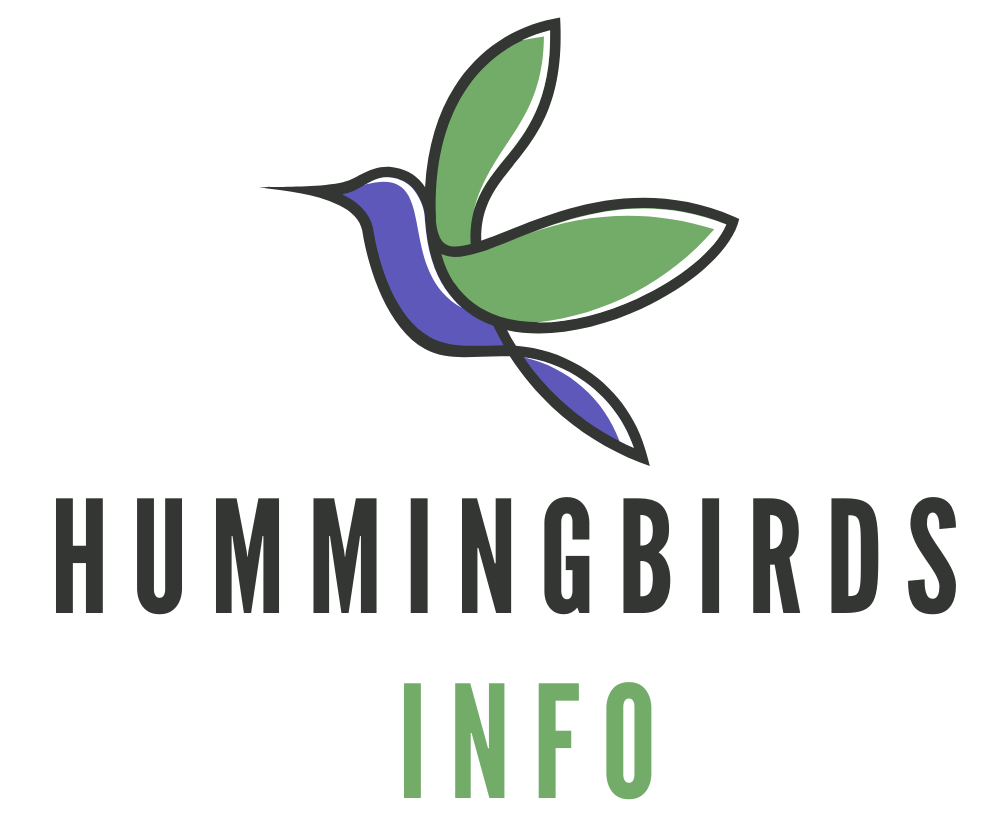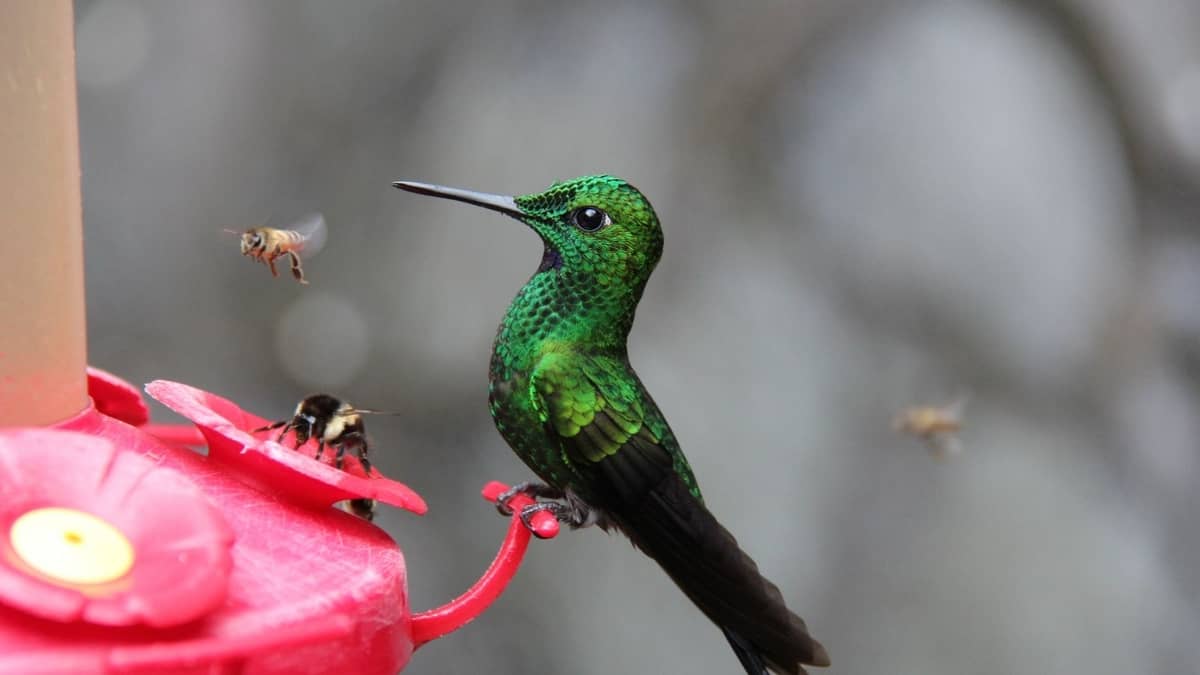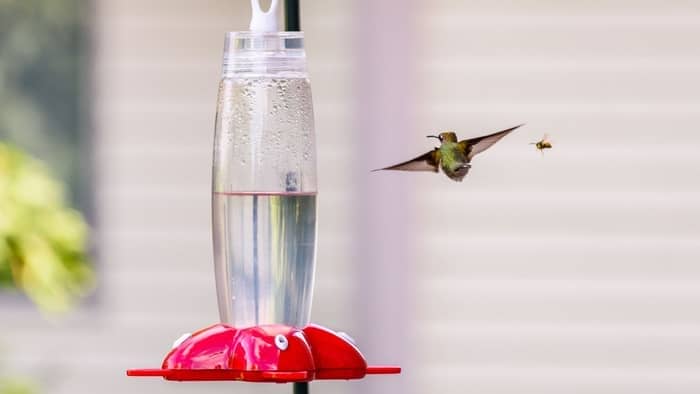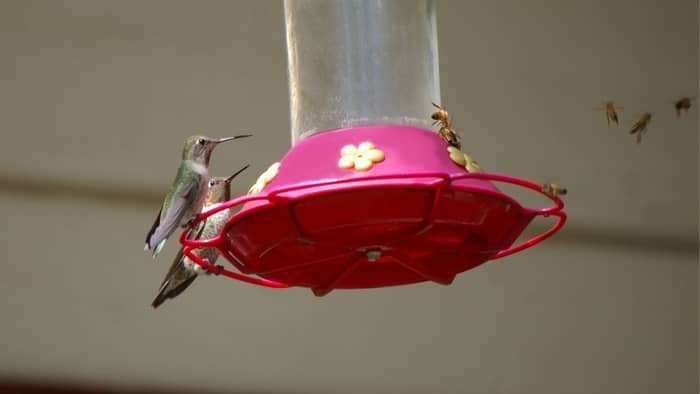Last Updated on May 16, 2022 by Guillermina
Are hummingbirds afraid of bees? Find out if there is a rivalry among these visitors to our gardens.
If you like hummingbirds, you may have various controversial questions about them, especially when it comes to the relationship between bees and these little birds. Hummingbirds are attracted to a good nectar recipe, but they are not alone, there are also ants, bees, hornets, wasps, and other sweet-loving insects.
Lately, we often hear the question “are hummingbirds afraid of bees”? Hence, let us explain.
What Attracts Bees To Come Close To Hummingbirds?
Although very small, hummingbirds require a high-energy food, and this is where sweet nectar comes into play. However, they are not the only ones longing for it. Honey bees collect sweet nectar and order to produce honey. So, it’s no wonder you can often see hummingbirds outdoors sharing nectar with bees and wasps.
Blooming fields offer a multitude of different flowers available and enough space for everyone to spread out. Sometimes even two different species of fliers can extract nectar from the same flower. So, it’s time to find out the answer to the question “are hummingbirds afraid of bees”?
Are Hummingbirds Afraid Of Bees?
In short, no. Hummingbirds are not afraid of bees. If you have a few insect visitors in your garden, this will not stop these little birds from visiting. However, keep in mind that it won’t be too much fun for them to fight with thousands of bees to get sweet food. If you notice too many bees on their feeders, the hummingbirds will refuse to visit them.
In addition to interfering with their feeding, these thirsty insects can drain a full hummingbird feeder quickly. Some species of birds usually eat intruders, but hummingbirds are not one of them.
How To Prevent Bees From Taking Over Feeders
You know how they say, prevention is better than cure. Accordingly, the best way to prevent bees from taking over your hummingbird feeder is prevention. Once the bees have adapted to your hummingbird feeder, it can be difficult to stop this behavior.
Here are some tips and tricks you can use to solve this problem:
- Try to get a feeder that has bee guards.
- Keep your feeder in the shade.
- Try to get red feeders, and avoid yellow ones.
- Get a feeder designed exclusively for bees and place it away from the one you intended for your hummingbirds.
- Plant more types of flowers that bees love to avoid their visits to the hummingbird feeder.
Read this article as well.
How Not To Remove Bees From Your Hummingbird Feeder?
Now that you know the correct answer to the question “are hummingbirds afraid of bees” and ways to prevent their arrival, it’s time to reveal to you methods you shouldn’t use when eliminating them from the feeder. Well, let’s get started.
Insecticides
No, no, and no again, by no means use insecticides. Did you know that even the smallest amount of these dangerous chemicals near the hummingbird feeder can be devastating to these tiny birds? Try not to use sprays near the feeder if hummingbirds are nearby.
If you have already decided to do that, do it outside of their season. Furthermore, in case you decide to use insect traps, try to move them away from the feeder.
Different Types Of Oils
Many often resort to using a variety of natural DIY insect preparations on hummingbird feeders. Some of these include the use of olive oil, cooking spray, petroleum jelly, or similar slippery substances around feeding ports.
These natural remedies can help fight bees, but experienced connoisseurs and hummingbird lovers will never recommend them as they can also harm birds by sticking to their feathers and making it more difficult, or even impossible for them to fly.
Abstract
By using these simple but effective prevention methods, you can manage insects so that they do not disturb hummingbird feeders while remaining a valuable part of the natural ecosystem.
That would be it, now you know the correct answer to the question “are hummingbirds afraid of bees”.
If you have any questions related to this topic, feel free to let us know in the comments.
You might also like this article Do Hummingbird Feeders Attract Bears? 7 Tips To Keep Them Away
FAQs
Do Bees Bother Hummingbirds?
Hummingbirds are aggressive feeders and probably won't be deterred by a few bees or ants here and there. However, keep in mind that if there are too many different types of insects, ants, etc. around the feeder, it becomes contaminated and less attractive to hummingbirds.
What Is A Bee Guard For Hummingbird Feeder?
There is almost no owner of the feeder who has not met bees who will not leave the feeder alone. In this case, bee guards usually help.
Simply put, it is a small piece of flexible plastic that attaches to a feeding port. Namely, the point is that the center of each plastic type is always closed, which prevents the bees from reaching the nectar. On the other hand, when the hummingbirds stick their beaks inside, the bee guards open automatically so the birds can gain access to the sugar water.
Do Bees Proof Hummingbird Feeders Work?
Of course, they work. Moreover, lately, more and more feeders have built-in some bee-proof features. Namely, they keep bees from reaching the hummingbird food. Once they realize they won’t be able to get to the nectar, the bees usually give up soon and move on.
Most feeders that have bee guard features have a flexible membrane in the center which easily opens up when a hummingbird inserts its beak into the feeding port to feed. When they finish feeding and pull out their beak, the membrane closes tight to keep bees and wasps out of your feeder.



